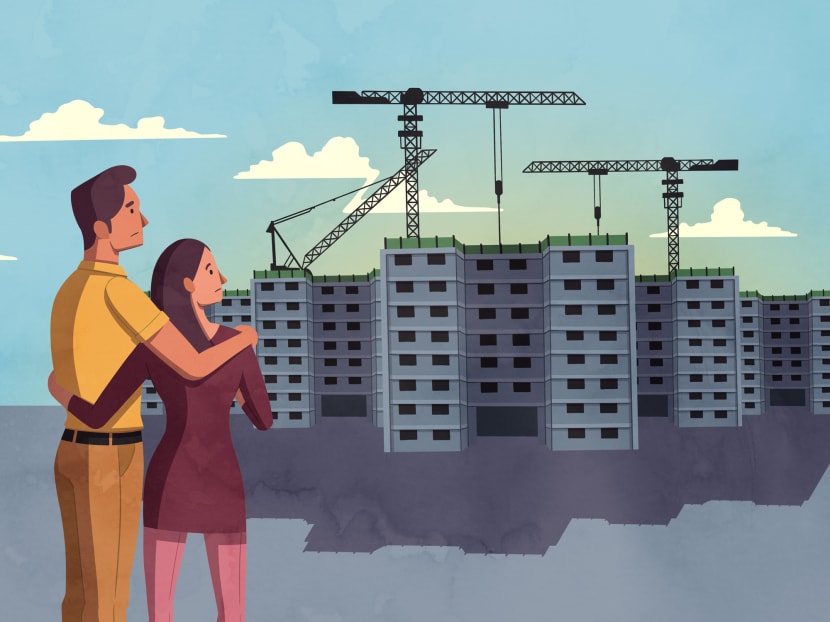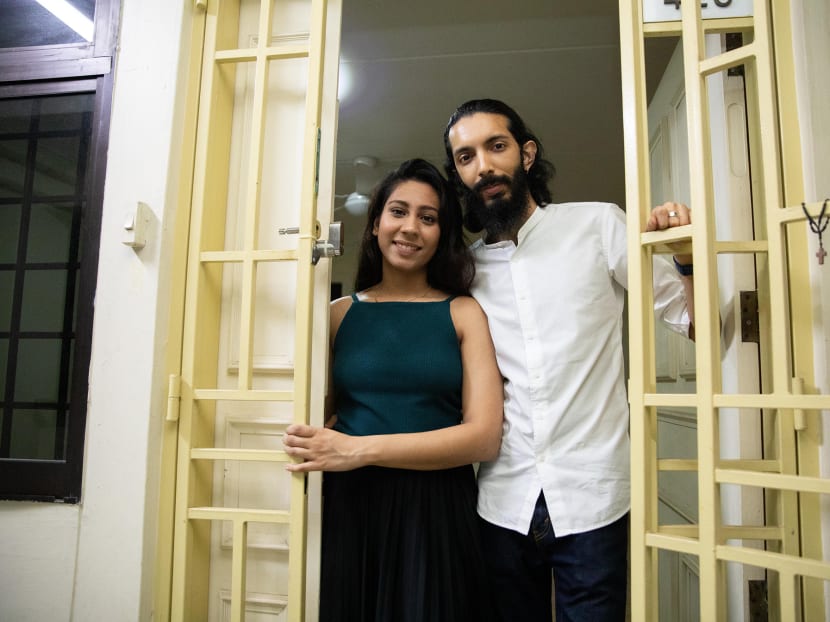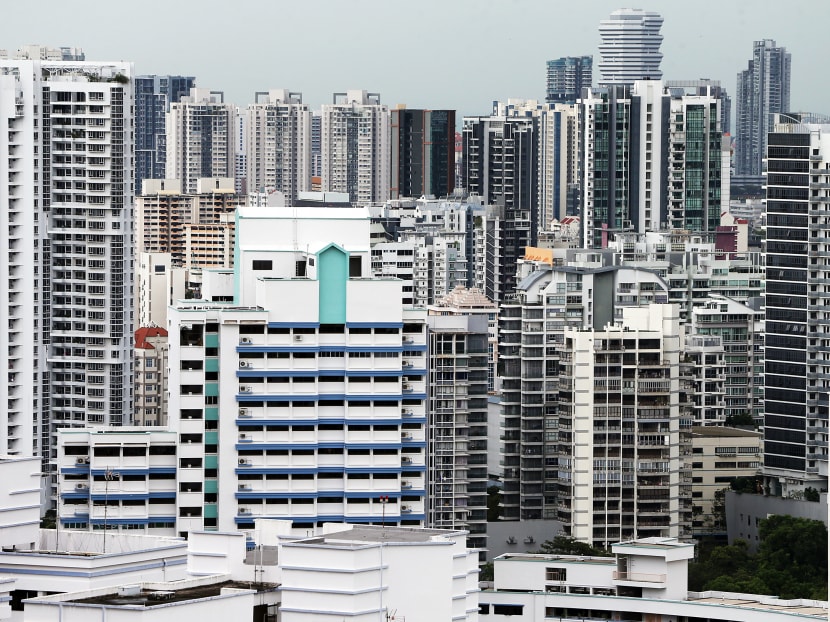The Big Read in short: First-time homebuyers caught in property market perfect storm
Each week, TODAY’s long-running Big Read series delves into the trends and issues that matter. This week, we look at how rising property prices and rentals, due to a confluence of factors, are affecting young couples and other first-time homebuyers. This is a shortened version of the full feature.

BTO supply is curtailed by construction delays, but HDB resale flat prices have shot up 8 per cent over the past year, while condo prices are at a historic high.
Each week, TODAY’s long-running Big Read series delves into the trends and issues that matter. This week, we look at how rising property prices and rentals, due to a confluence of factors, are affecting young couples and other first-time homebuyers. This is a shortened version of the full feature, which can be found here.
- It is a challenging time for young couples and other first-time homebuyers amid the pandemic
- BTO supply is curtailed by construction delays, but HDB resale flat prices have shot up 8 per cent over the past year, while condo prices are at a historic high
- Stuck in a tough place, some couples are delaying their wedding plans and parenthood
- Some of them believe that the situation is serious enough to warrant some government intervention to help them afford their first flats
- Instead of bluntly cooling the market, analysts suggest targeted measures, such as those that can lower cash-over-valuation quantums, cool rental rates
SINGAPORE — The delays in the construction of Build-To-Order (BTO) flats couldn’t have come at a worse time for young couples eager to set up their very first marital home.
The buoyant housing market — which seems to care little for the economic havoc caused by Covid-19 — means that other options, such as buying a resale HDB flat, are slipping from their reach.
Graphic artist Mark Yong, 28, for example, had set aside a S$470,000 budget for a five-room HDB flat in Sengkang that is within walking distance from an MRT station.
While his friend managed to snag one of these units on the mid-floor for S$460,000 in the middle of last year, Mr Yong, who proposed to his girlfriend last month, is now looking at resale units costing at least S$500,000, even though some of them are on low floors.
Communications consultant Ho Xiu Xian, 28, and her fiancé, filmmaker Jun Chong, 30, felt that a lot of their housing decisions had been “compromised and affected” due to the rising costs of flats.
They are hoping to live near either of their parents in Tiong Bahru and Bishan, which are prime areas.
“Should we wish to stay in these locations, we would have to be prepared to compromise and settle for a smaller flat. However, this will not be an ideal solution, especially if we plan to have children,” Ms Ho said.
The situation is not unique to Singapore, with countries such as Australia and the United States also experiencing a housing boom, due to a combination of various factors including those related to the pandemic.
RESALE MARKET SITUATION
A 27-year-old engineer, who only wanted to be known as Maegan, said the uncertainty surrounding whether her BTO flat, which was slated for completion in 2024, would be delayed has made it hard to plan having a family and budget for the next few years.
Most of her friends are not considering a BTO unit at all and going straight for resale flats, she said.
However, the cash outlay can be too high for young couples in the current resale market, given that cash over valuation (COV) has begun to rise after staying suppressed for years.
Property experts told TODAY that recent COV figures typically range between S$10,000 and S$50,000. However, it is not unheard of for someone to pay between S$100,000 and S$200,000 for choice flats.
Fresh graduate Vishaljit Singh Sandhu, 27, who is currently looking for a job, suggested waiving the COV’s cash requirement for first-time buyers, so they can service the amount by mortgage instead.
He was hit with a S$40,000 COV for his recent S$425,000 four-room flat purchase with his 25-year-old fiancée, and was only able to pay the amount in cash due to his late father’s insurance claims. The flat is located opposite Admiralty MRT Station at Woodlands Ring Road.

OVER IN THE PRIVATE PROPERTY SEGMENT…
If young couples are finding it increasingly hard to get an affordable public flat which meets all their criteria, would getting a home in the private property market — which has also been hit by building delays and is facing renewed interest from foreign investors — be even more of a pipe dream in the current climate?
Mr Alan Cheong, executive director of the research and consultancy team at real estate firm Savills Singapore, said it is still possible for an average 30-year-old couple to buy a condo — if they don’t mind staying in a smaller condo unit compared to a HDB flat.
They would most likely also need to have a combined income of at least S$12,000, and have well-heeled parents who could support their condo’s hefty 25-per-cent down payment, which could easily amount to S$300,000 for a S$1.2 million unit, he added.
Indeed, a couple in their early 30s, a lawyer and an office administrator who both declined to be named, said they would only be able to afford to buy a two-bedroom condominium in the city fringe with their parents’ financial support.
The couple started looking for a condo that costs between S$1.2 million and $1.5 million last month, since their parents were willing to help pay part of the “painful and very big” down payment first while they slowly repay them in the future. They are comfortable with the mortgage due to their combined income of more than S$15,000.
Ms Hoong Huifang, 31, who is currently looking to buy a private apartment with her husband, wants a house that is close to where their parents live, in the Core Central Region.
However, most of the new condo launches around the area are in the S$2,000 psf range, and older condos at least the size of a four-room BTO are priced at around S$1.5 million.
“Of course, another option would be to live further away from our parents as houses would be more affordable in those areas, but proximity is a priority for us,” she said.
A Singaporean-foreigner couple interviewed is also caught in a bind.
After renting a S$3,200-a-month flat here for four years, a 37-year-old manager, who wanted to be known only as Anna, said she and her American husband started contemplating buying a house last November. Her husband, also 37, is an IT consultant on an employment pass.
But the couple with a combined income of more than S$14,000 recently decided to give up on the idea of getting a HDB resale flat or a condo.
Although they could technically afford a S$750,000 HDB flat in Rochor, which they were eyeing, they could not get enough of its upfront cost covered, given that banks are compelled to assess their ability to service the mortgage solely based on the salary of the Singaporean, Anna’s in this case.
“Under one salary, the quantum that we can borrow from the bank is really low. It’s so pathetic that we almost cannot afford a resale HDB unless we go to Chua Chu Kang and buy a three- or four-room flat,” the mother of a two-year-old told TODAY.
They then turned to the private market hoping to get a two-bedroom condo for about S$1.2 million, but they soon realised that the ones in Chua Chu Kang are costing S$1.4 million to S$1.5 million. Even worse, they would be subjected to a 25-per-cent down payment.
The requirement kicked in when the last round of market cooling measures were implemented in July 2018, which revised the sum that buyers could borrow from a bank to finance their home loan from 80 per cent of the purchase price or property value to 75 per cent.
Of the remaining 25 per cent, 5 per cent must be paid in cash, while the remaining 20 per cent can be paid using a combination of cash or savings from the buyers’ Central Provident Fund (CPF) Ordinary Account.
That, plus legal fees, stamp duties and renovation costs, would “wipe out” all their savings, Anna said.

GOVT INTERVENTION NEEDED?
Property experts said blunt cooling measures would not help.
Professor Sing Tien Foo, director at the National University of Singapore’s (NUS) Institute of Real Estate and Urban Studies (IREUS), said that while they could dampen the demand from investors or speculators and help stabilise prices, especially in the private residential segment, the correction may cause developers or existing owners to hold back their launches and sales.
This would then cause the supply to decline and, in turn, make it hard for young couples to upgrade, he noted.
“Given the current ultra-low interest rate environment, high transaction costs may still not fully eliminate hot money seeking for safe haven in Singapore, if foreign investments continue to pour into local private housing markets,” he added.
As to whether it would be a good idea to waive the COV’s cash requirement for first-time buyers, the experts said the move sounds easy to implement, but it comes with major ramifications if the market crashes.
Dr Lee Nai Jia, deputy director of IREUS, said such a waiver requires the underwriting institution, such as HDB or banks, to take up more risk, as the collateral worth of the estates that got their COV cash requirement waived would be lower if the market changes.
“You are essentially allowing borrowing above 100 per cent. For the resale market, is that viable?” he said. “If everything tanks, HDB can be bankrupt, throwing a much bigger problem down the road.”
To increase supply in the resale market to counter the effects of BTO construction delays, Dr Lee said HDB can consider reducing the five-year Minimum Occupation Period for new flats to three or four years for the time being.
This would not only increase the pool of HDB flats in the market that people can buy, it would create more competition, resulting in a lowering of COV rates as prices fall, he said.
Associate Professor of Urban Planning Lee Kwan Ok at NUS said one possible government action may be to increase property tax for existing homeowners, especially those who own multiple luxurious housing units.
“One simple reason behind the supply-demand gap is because some people own multiple homes,” she said. “The government action should be towards giving more pressure to these people and making them sell their housing in the market, and in turn, increasing supply for young people.”
To address immediate needs, Mr Henry Kwek, Member of Parliament for Kebun Baru, had in February proposed building a certain type of HDB flats that can be used as "stock holding" so that young couples with children can live in them while waiting for their BTO flats to be completed.
In the same vein, NUS’ Associate Professor Fu Yuming suggested that the Government’s approach does not always have to be building new homes for sale only.
He pointed out that built-to-rent housing that provides tenure security and attractive shared amenities is getting popular among young people in many countries.
“It expands the diversity of housing opportunities, especially for people facing credit constraints for homeownership. The built-to-rent housing also provides attractive long-term investment opportunities sought after by institutional investors,” he said.








